Recipes and Cooking Tips
Is Peanut Butter Toast a Healthy Breakfast? Delicious and Nutritious!
Looking for a quick, healthy breakfast option? Discover the surprising benefits of peanut butter toast that will make you rethink your morning routine!
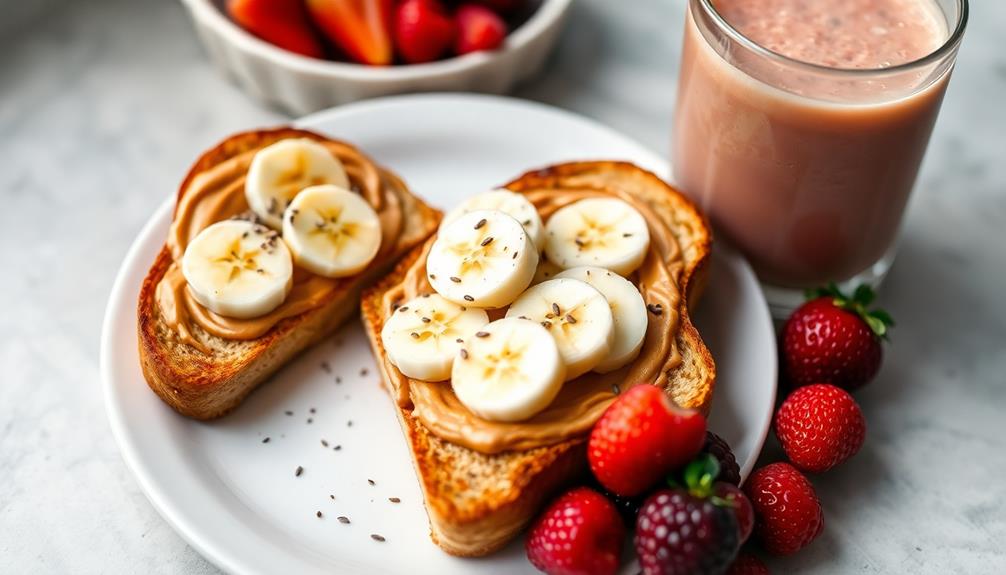
Peanut butter toast is a healthy and delicious breakfast choice that fuels your day. It combines whole-grain bread's fiber and complex carbohydrates with peanut butter's healthy fats and protein. This combo keeps you full longer, aids digestion, and supports heart health. You can elevate its nutrition by adding sliced bananas or berries for vitamins and antioxidants. Plus, it's budget-friendly and quick to prepare, making it perfect for busy mornings. If you're curious about more benefits or topping ideas, you might want to explore additional tips for making your peanut butter toast even tastier and more nutritious! There are plenty of other healthy breakfast ideas out there, but peanut butter toast is a staple for many people due to its convenience and nutritional benefits. If you’re looking to mix things up, consider trying avocado toast, Greek yogurt with granola and fruit, or a smoothie packed with greens, fruits, and protein. With a little creativity and planning, you can start your day off right with a variety of nutrient-dense breakfast options.
Key Takeaways
- Peanut butter toast combines protein, healthy fats, and fiber, providing sustained energy and satiety throughout the morning.
- Whole-grain bread adds essential nutrients and stabilizes blood sugar levels, making it a balanced meal choice.
- Toppings like bananas or honey enhance flavor and nutritional value, contributing vitamins and natural sweetness.
- It's a cost-effective breakfast option, utilizing affordable ingredients without compromising on health benefits.
- Compared to typical cereals, peanut butter toast offers higher protein and healthy fats, supporting muscle repair and heart health.
Nutritional Benefits of Peanut Butter
Peanut butter is more than just a tasty spread; it's packed with nutritional benefits that can enhance your breakfast. When you add peanut butter to your meal, you're not just indulging in flavor; you're also fueling your body with essential nutrients.
A dietitian would likely highlight its impressive protein content—about 8 grams per 2 tablespoons—crucial for muscle repair and growth.
Moreover, peanut butter is rich in healthy fats, particularly monounsaturated fats, which promote heart health and help regulate cholesterol levels. You'll also find about 3 grams of fiber in those same 2 tablespoons, aiding digestion and keeping you feeling full longer, which is especially beneficial for weight management.
Peanut butter's wealth of vitamins and minerals, including Vitamin E, magnesium, and Vitamin B6, support your immune function and energy production. Plus, with its low carbohydrate content, it fits nicely into low-carb diets while still providing the energy you need for your day.
Pair it with whole grain toast, and you've got a breakfast that's not only delicious but also packed with nutritional benefits!
Peanut Butter Toast Variations

How can you make your peanut butter toast even more delicious and nutritious? There are plenty of variations that not only enhance flavor but also boost its health benefits. Start by choosing whole-grain bread as your base. This adds complex carbohydrates and fiber, making your healthy breakfast more satisfying.
Consider these tasty additions:
- Sliced bananas: They provide potassium and natural sweetness, balancing the richness of peanut butter without unnecessary added sugars.
- A drizzle of honey or maple syrup: These natural sweeteners complement the peanut butter, adding flavor and nutrients without going overboard on sugars.
- A sprinkle of cinnamon: This simple spice enhances taste and may help with blood sugar control and inflammation.
For an even better start to your day, pair your peanut butter toast with a glass of milk or yogurt. This combo boosts your protein intake, promoting muscle repair and growth.
Pairing Peanut Butter With Fruits
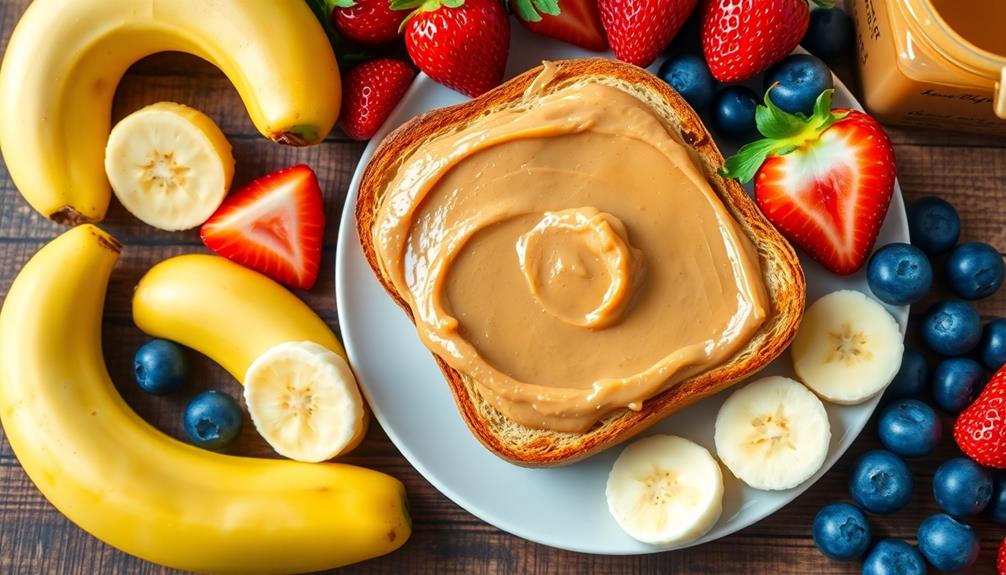
When it comes to breakfast, pairing peanut butter with fruits can elevate the nutritional value and flavor of your meal. This combination is not just tasty; it enhances the overall nutrition by adding natural sugars, fiber, and essential vitamins. For instance, a small banana offers about 12g of naturally occurring sugar and 3g of fiber, making it a perfect match for peanut butter.
Here's a quick look at some fruit options and their benefits when paired with peanut butter:
| Fruit | Nutrition Benefits | Fiber Content |
|---|---|---|
| Banana | Adds natural sugars and vitamins | 3g |
| Strawberries | Provides antioxidants and vitamin C | 2g |
| Blueberries | Rich in antioxidants and nutrients | 4g |
| Drizzled Honey | Enhances sweetness with minimal added sugars | 2.5g per half tsp |
Combining peanut butter with these fruits not only boosts your breakfast's flavor but also increases satiety. The fiber from the fruits works well with the protein and healthy fats in peanut butter, helping you feel fuller longer without the need for excessive added sugars. Enjoy this delicious, nutritious combo!
Cost-Effective Breakfast Choices
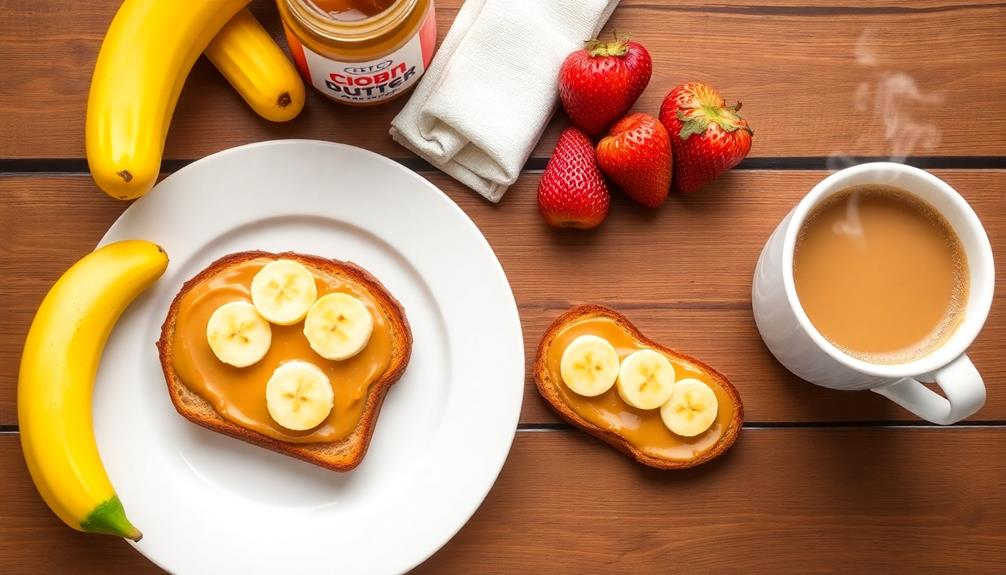
Finding budget-friendly breakfast options can be a game changer, especially when you want to maintain a healthy diet. Peanut butter toast is one of the most cost-effective breakfast choices you can make. It combines nutritious meals with affordability, ensuring you get the energy you need to kickstart your day.
Consider these points when planning your breakfast:
- Peanut butter is generally cheaper than specialty nut butters, making it an economical choice.
- Whole-grain toast is often available on sale and can be frozen, providing a long-lasting source of complex carbohydrates.
- Bananas, which pair perfectly with peanut butter, typically cost less than $0.20 each.
Preparation Tips for Peanut Butter Toast

Peanut butter toast offers a quick and nutritious breakfast option, and preparing it can be both simple and rewarding. Start by choosing whole-grain or whole wheat bread to maximize fiber content, which promotes sustained energy throughout the morning.
Toast your bread to your desired crispiness, then spread 1-2 tablespoons of natural peanut butter on top. This gives you a balanced combination of healthy fats, protein, and fiber, helping you feel full longer.
To elevate the flavor and nutritional value, add sliced bananas or a drizzle of honey. Bananas complement the peanut butter beautifully while providing extra vitamins and minerals.
If you're feeling adventurous, consider sprinkling some cinnamon or chia seeds on top. Cinnamon can help regulate blood sugar levels, and chia seeds add even more fiber and omega-3 fatty acids.
With this easy preparation, you can whip up your peanut butter toast in under five minutes. It's a delicious way to start your day, combining taste and nutrition effortlessly!
Enjoy experimenting with different toppings to make your breakfast even more exciting!
Peanut Butter Toast vs. Cereal
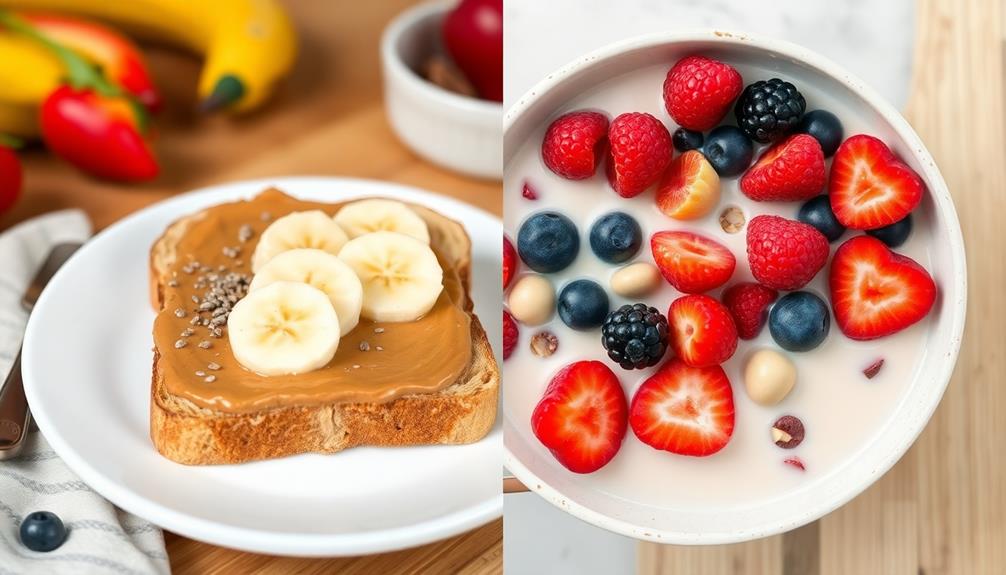
When you compare peanut butter toast to cereal, the nutritional differences are striking.
Peanut butter toast packs in healthy fats and protein that help keep you full longer, while cereal often falls short in both areas.
Understanding these energy-sustaining properties can help you make a more informed breakfast choice.
Nutritional Comparison Analysis
For those seeking a nutritious breakfast, a comparison between peanut butter toast and cereal reveals significant differences in their nutritional profiles. While cereal might seem like a quick option, peanut butter toast offers a range of benefits that can enhance your morning.
- Peanut butter toast provides about 8 grams of protein, which is more than most cereals, helping you feel fuller longer.
- With approximately 16.5 grams of healthy fats, peanut butter toast contributes to greater satiety compared to cereal's mere 4 grams of fat.
- Whole-grain toast topped with peanut butter adds fiber and complex carbohydrates, stabilizing blood sugar levels and reducing sugar spikes.
While peanut butter toast has around 81 mg of calcium, cereal with milk offers about 247 mg, so calcium content is worth considering.
However, the nutrient density of peanut butter toast, along with its healthy fats and protein, makes it a more balanced choice for breakfast.
Energy Sustaining Properties
Choosing peanut butter toast over cereal not only offers a nutritious start to your day but also delivers sustained energy that keeps you feeling full longer. Peanut butter is packed with about 16.5 grams of healthy fats per serving, considerably more than the mere 4 grams found in most cereals. This higher fat content contributes to increased satiety, preventing those mid-morning cravings.
When you spread peanut butter on whole-grain toast, you combine approximately 8 grams of protein with complex carbohydrates, providing a steady release of energy. This combination outshines the quick-fix energy spikes often associated with sugary cereals.
Additionally, the fiber from whole-grain bread promotes digestive health and keeps you feeling satisfied longer, while many cereals lack sufficient fiber.
Peanut butter's monounsaturated fats support heart health and help stabilize blood sugar levels, making your breakfast more balanced. Pair it with a banana and a glass of milk, and you'll enhance the nutrient density of your meal, offering a more extensive range of vitamins and minerals compared to a typical bowl of cereal.
Common Misconceptions About Peanut Butter
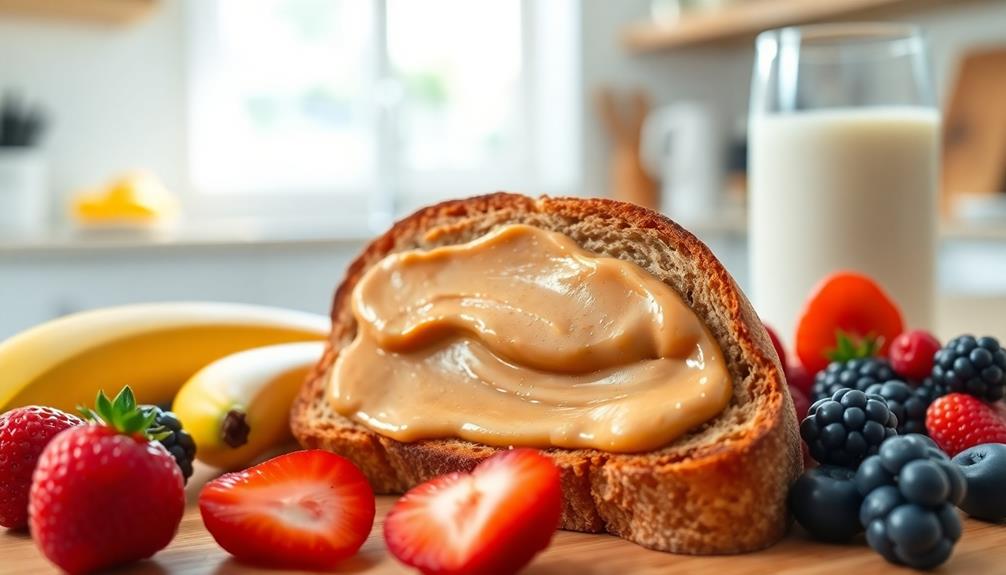
Peanut butter often faces unfair criticism, leading many to believe it's unhealthy. While it's true that peanut butter is calorie-dense, it's also packed with healthy fats and protein, making it a nutrient-dense option when consumed in moderation.
Here are a few common misconceptions:
- Peanut butter causes weight gain. In reality, it can enhance satiety, helping you control your appetite.
- All peanut butters are the same. Choosing natural varieties with minimal ingredients can help you avoid added sugars and unhealthy fats.
- Peanut butter is bad for heart health. On the contrary, its monounsaturated fats support healthy cholesterol levels and overall heart health.
Critics often point to lectins found in peanut butter but overlook the many health benefits it offers, such as muscle repair and heart support.
When you enjoy peanut butter as part of a balanced diet, you harness its potential without the downsides.
Health Benefits of Whole-Grain Bread

Whole-grain bread complements peanut butter toast perfectly, enhancing both flavor and nutrition. One of the standout health benefits of whole-grain bread is its high fiber content. With about 3-4 grams of dietary fiber per slice, it supports improved digestion and reduces the risk of heart disease.
By incorporating whole grains into your breakfast, you can enjoy better heart health while savoring your toast.
Moreover, whole grains can help with weight management. They promote satiety, helping you feel full longer and regulate your appetite more effectively than refined grains. This can be particularly useful if you're looking to maintain a healthy body weight.
Another advantage of whole-grain bread is its ability to stabilize blood sugar levels. The complex carbohydrates in whole grains digest slowly, providing sustained energy throughout the morning. This means you won't experience those dreaded energy crashes that often come with refined carbs.
Lastly, whole-grain bread is a fantastic source of B vitamins, essential for energy metabolism and overall health. By choosing whole-grain bread for your peanut butter toast, you're making a nutritious choice that fuels your day right.
Creative Topping Ideas
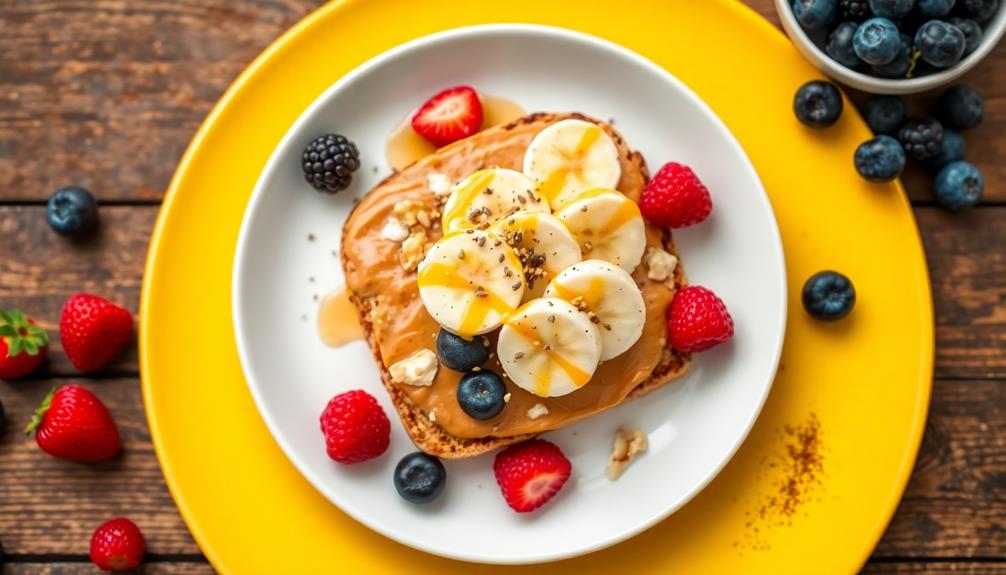
Elevate your breakfast game by experimenting with creative toppings for your peanut butter toast. The right toppings not only enhance the flavor but also boost the nutrition, making your meal a powerhouse of healthy options. Here are some ideas to inspire you:
- Sliced bananas: They add about 3g of fiber and potassium, making your toast even more nutritious.
- Fresh berries: Strawberries or blueberries are rich in antioxidants, providing vitamins and a burst of flavor without added sugars.
- Chia or flaxseeds: Sprinkle these on top for an extra dose of omega-3 fatty acids and fiber, promoting heart health and digestive wellness.
For a touch of sweetness, drizzle a small amount of honey, which adds natural sweetness without excessive added sugars.
Alternatively, for a savory twist, a sprinkle of cinnamon or a pinch of sea salt can enhance the nutty flavor of peanut butter while keeping your toast nutritious.
With these creative toppings, your peanut butter toast becomes a delicious and balanced breakfast that satisfies your taste buds and supports your health goals. Enjoy experimenting and find your favorite combinations!
Balancing Your Breakfast Meal
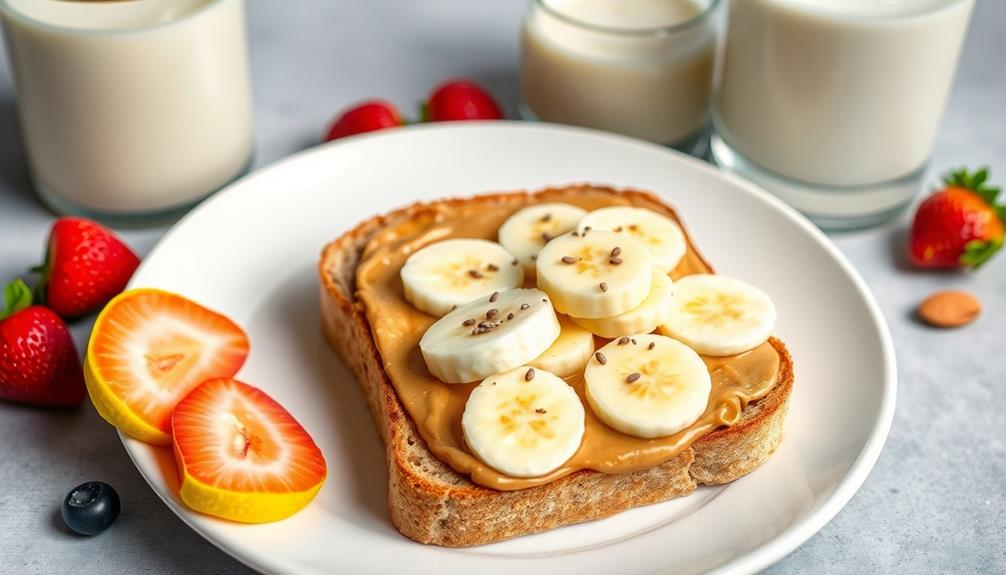
Creating a balanced breakfast is key to ensuring you start your day on the right foot. Peanut butter toast is a fantastic choice that combines healthy fats, protein, and fiber, helping you maintain stable blood sugar levels and providing sustained energy throughout the morning.
To maximize the nutritional benefits, consider pairing your peanut butter toast with whole-grain bread. This increases your fiber intake, promoting a healthier digestive system and longer-lasting fullness. Adding sliced bananas or a drizzle of honey can enhance taste while offering extra vitamins and natural sugars for energy. Don't forget to include a glass of milk — it boosts your calcium and vitamin D intake, which is essential for bone health.
Here's a quick breakdown of the components of a balanced peanut butter toast meal:
| Component | Benefits |
|---|---|
| Peanut Butter | Healthy fats, 8g protein, 3g fiber |
| Whole-Grain Bread | Complex carbohydrates, additional fiber |
| Sliced Bananas | Vitamins, natural sugars |
| Glass of Milk | Calcium, vitamin D |
Incorporating these elements into your breakfast routine can help you feel energized and ready to tackle the day!
Frequently Asked Questions
Is Peanut Butter and Toast a Healthy Breakfast?
You'll find peanut butter and toast offers a balanced start to your day. The healthy fats and protein keep you full longer, while whole-grain bread provides energy and essential nutrients for sustained morning productivity.
Is It Okay to Eat Peanut Butter Toast Every Day?
Imagine starting each day with a warm hug of flavor. Yes, you can eat peanut butter toast daily! Just watch your portions, choose whole grain bread, and mix in fruits for extra nutrition and variety.
Is Peanut Butter or Eggs Better for Breakfast?
When deciding between peanut butter and eggs for breakfast, consider your needs. Peanut butter offers healthy fats and protein, while eggs provide high-quality protein and essential nutrients. Both can support a balanced, energizing morning!
Which Is Healthier, Avocado Toast or Peanut Butter Toast?
When comparing avocado toast and peanut butter toast, you'll find each has unique benefits. Peanut butter toast offers more protein and healthy fats, while avocado toast provides essential vitamins. Choose based on your nutritional needs and preferences.
Conclusion
To sum up, peanut butter toast isn't just a breakfast; it's a deliciously nutritious powerhouse that fuels your day. With endless variations, you can enjoy it while boosting your health and wallet alike. Just remember to balance your meal with fruits or other toppings to hit all the right notes. So, go ahead and make your mornings brighter—after all, who wouldn't want to start their day with a breakfast that feels like a warm hug?
Recipes and Cooking Tips
How to Have a Healthy Breakfast: Simple Steps for a Nutritious Start!
Learn how to kickstart your day with a healthy breakfast that boosts energy and focus—discover simple steps to transform your mornings!

To have a healthy breakfast, start with a balance of protein, fiber, and healthy fats. Include whole grains, like oatmeal or whole grain bread, which provide sustained energy. Add fruits and vegetables for essential vitamins and antioxidants. You can whip up a savory omelet packed with veggies or enjoy overnight oats topped with your favorite fruits. Don't forget to plan your meals in advance to avoid unhealthy choices. By making breakfast a priority, you'll feel more energized and focused throughout the day. Discovering more delicious ideas and tips can keep your mornings exciting!
Key Takeaways
- Start your day with a balanced meal that includes protein, whole grains, fruits, and healthy fats for sustained energy.
- Plan your breakfast in advance to avoid unhealthy last-minute choices and ensure you have nutritious options available.
- Incorporate vegetables into your breakfast dishes, such as omelets or smoothies, for added fiber and essential vitamins.
- Experiment with various healthy ingredients and recipes to keep your breakfast exciting and nutrient-dense.
- Monitor portion sizes to prevent overeating, even when choosing healthy breakfast options.
Importance of Breakfast
Many people often underestimate the importance of breakfast, but skipping it can have significant consequences on your health. This vital meal sets the tone for your day, impacting everything from your energy levels to your mood.
Studies show that regularly consuming a healthy breakfast is associated with a lower risk of obesity, cardiovascular disease, and even Type 2 diabetes. Incorporating nutrient-dense options like those found in Keto Breakfast With Eggs can help guarantee you're starting your day right. By starting your day with a well-balanced breakfast, you're not just fueling your body; you're also making a smart choice for your long-term health.
When you eat breakfast, you're likely to have a healthier diet overall, which can lead to improved concentration and cognitive performance throughout the day. Skipping breakfast, on the other hand, can leave you feeling sluggish and unfocused, affecting your productivity.
A nutritious morning meal can enhance your mood and energy, making it easier to tackle daily tasks. So, don't overlook breakfast; it's more than just food. It's a foundational part of a healthy lifestyle.
Prioritizing this significant meal can set you on the right path for better health and well-being, helping to keep chronic diseases at bay while improving your overall quality of life.
Nutritional Components
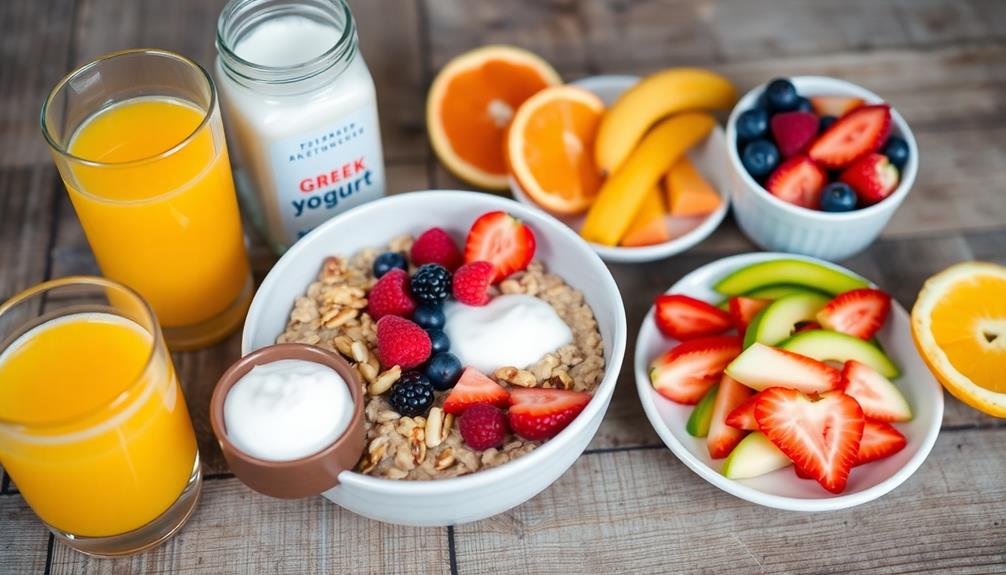
To kickstart your day, it's vital to include essential nutrients in your breakfast.
Balancing macronutrients like protein, fiber, and healthy fats will keep your energy levels steady and help you feel full longer.
Incorporating foods rich in antioxidants, such as celery juice benefits, can also enhance your overall health.
Let's explore how to effectively combine these components for a nutritious morning meal.
Essential Nutrients Overview
Starting your day with a balanced breakfast is essential for fueling your body and mind. To achieve this, focus on incorporating essential nutrients that will support your energy levels and keep you satisfied throughout the morning.
Consider pairing your breakfast with a cup of coffee brewed using methods like the French press for a rich flavor and an added energy boost.
First, aim to include a source of protein, such as eggs, yogurt, or nuts. Protein helps maintain energy and reduces hunger pangs later in the day.
Next, choose whole grain bread or oatmeal, which provide fiber and crucial nutrients. Fiber aids digestion and stabilizes blood sugar levels, preventing energy crashes that can occur with sugary options.
Don't forget to add fruits and vegetables to your breakfast. They're packed with vitamins, minerals, and antioxidants necessary for overall health.
Consider topping your oatmeal with berries or adding spinach to your morning omelet.
Balancing Macronutrients Effectively
When crafting a balanced breakfast, it's crucial to effectively balance macronutrients—proteins, carbohydrates, and fats. Start with a good source of protein like eggs, Greek yogurt, or nuts. These options not only support muscle health but also keep you feeling full longer, reducing the chances of mid-morning snacking.
Consider including easy keto breakfast ideas such as scrambled eggs with spinach, which adds valuable nutrients to your morning meal.
Next, incorporate whole grains such as oatmeal or whole grain toast. These foods are rich in fiber, which helps stabilize blood sugar levels and prevents energy crashes. Pairing your grains with fruits and vegetables is a smart move. Fresh fruits like berries or bananas add natural sweetness and crucial vitamins, while vegetables provide essential minerals and antioxidants for overall health.
Lastly, don't forget healthy fats. Including avocado or a handful of nuts enhances heart health and aids in the absorption of fat-soluble vitamins from your breakfast.
Quick Breakfast Ideas
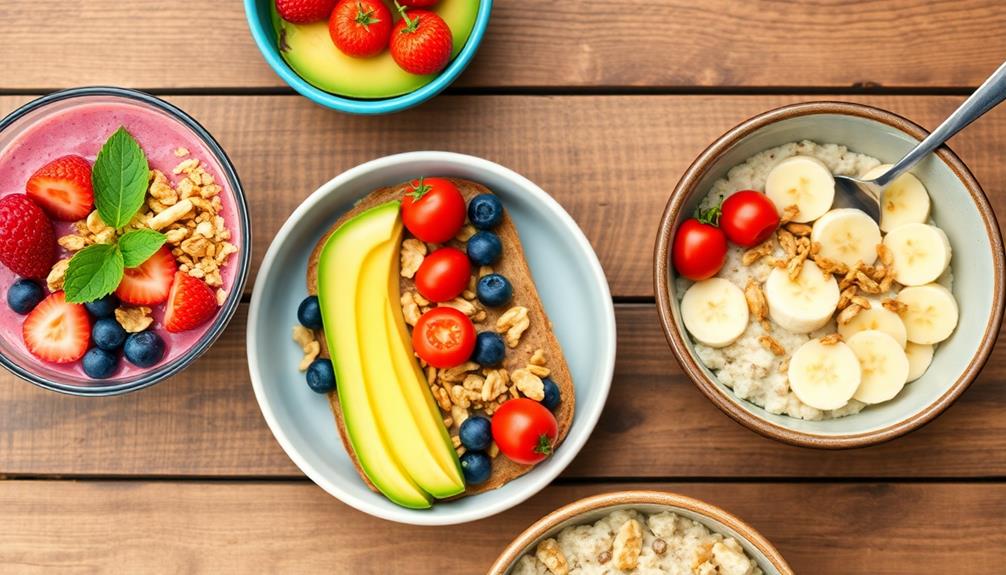
When mornings are hectic, quick breakfast ideas can save the day without sacrificing nutrition.
You can whip up nutritious smoothie recipes, explore savory egg dishes, or try out different overnight oats variations that fit your taste.
Let's explore these tasty options that keep you energized and satisfied!
Nutritious Smoothie Recipes
Smoothies pack a powerful punch as a quick breakfast option, effortlessly blending together fruits, vegetables, and protein sources to create a nutrient-dense meal. They're perfect for those busy mornings when you want something nutritious without the hassle.
Additionally, incorporating ingredients that support your overall health, like those that help manage uric acid levels, can be beneficial for individuals with specific dietary needs gout-friendly foods.
Consider these tips for making delicious smoothies:
- Use frozen fruit for a invigorating chill and added nutrients.
- Add leafy greens like spinach for an extra boost of vitamins and minerals.
- Incorporate sources of fiber and protein, such as yogurt or protein powder, to keep you full longer.
- Prepare make-ahead smoothie packs, so you can just blend and go!
A Spinach-Avocado Smoothie can provide 18g of protein and 8g of fiber, making it an ideal choice to kickstart your day.
Not only do smoothies cater to your taste preferences, but they also help enhance your daily vegetable intake seamlessly. With a little creativity and planning, you can enjoy a nutritious morning that fuels your body and keeps you energized throughout the day.
Savory Egg Dishes
Savory egg dishes are a fantastic way to kickstart your morning, packed with protein and essential nutrients that keep you energized. Options like omelets and frittatas not only taste great but also help you feel full longer. By incorporating vegetables like spinach, tomatoes, and peppers, you enhance the nutritional value of your breakfast, adding crucial vitamins and minerals.
You can prepare these dishes using various cooking techniques. Sautéing vegetables or baking egg muffins creates flavorful, nutrient-dense meals that are easy to make in advance. This versatility allows you to customize your savory egg dishes with different herbs, spices, and cheeses to suit your taste preferences.
If you're busy in the mornings, consider making breakfast burritos or quiches ahead of time. These convenient, on-the-go options can be stored in the fridge or freezer, ensuring you always have a nutritious meal of the day ready to grab.
With savory egg dishes, you can enjoy a balanced breakfast option that fuels your day, all while savoring the delicious flavors you love. So, why not whip up a savory egg dish tomorrow morning? You'll be glad you did!
Overnight Oats Variations
Overnight oats are often the perfect solution for busy mornings, offering a quick and nutritious breakfast that you can prepare in just minutes the night before.
You'll love the versatility of this dish, as you can customize it to fit your taste preferences and nutritional needs.
Here are some delicious variations to try:
- Berry Bliss: Mix rolled oats with Greek yogurt, almond milk, and top with fresh fruit like strawberries and blueberries.
- Nutty Banana Delight: Combine oats with nut butter, sliced bananas, and a sprinkle of cinnamon for a wholesome treat.
- Cinnamon-Roll Oats: Soak your oats in almond milk, add a dash of vanilla, and finish with a swirl of maple syrup and berries.
- Savory Sriracha Oats: For a unique twist, blend oats with avocado, a soft-boiled egg, and drizzle Sriracha for a kick.
Common Myths and Mistakes

Breakfast is often surrounded by a cloud of misconceptions that can lead to poor dietary choices. One common misconception is that skipping breakfast helps with weight loss. In reality, it often leads to overeating later and a higher risk of obesity.
You might think that all breakfast cereals are healthy, but many pack in added sugars, which can spike your blood sugar and cause energy crashes.
Another mistake is assuming that breakfast has to be a large meal to be effective. A balanced breakfast can be small yet still provide the nutrients you need.
Relying on sugary pastries or processed options is another pitfall; these not only fail to nourish you but can also contribute to serious health issues over time.
Tips for a Healthy Routine
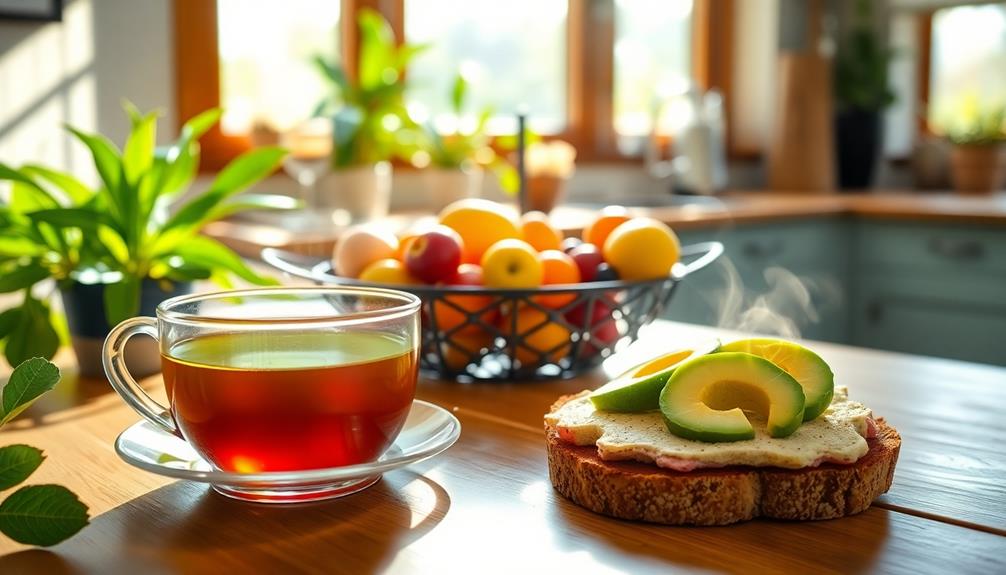
To set yourself up for a successful day, establishing a healthy breakfast routine is key. Start by planning your morning meal options ahead of time. This helps you avoid those unhealthy last-minute choices.
Set aside a few minutes every morning to enjoy your breakfast without rushing; this can improve digestion and enhance your overall experience.
Here are some tips to help you maintain a healthy routine:
- Make it interesting: Experiment with a variety of healthy ingredients to keep your breakfast exciting and nutrient-rich.
- Add vegetables: Incorporate veggies into your dishes for added fiber and vitamins.
- Monitor portion sizes: Even healthy foods can lead to overeating, so keep an eye on your portions.
- Freeze the leftovers: If you make extra, freezing leftovers can save time and prevent waste for busy mornings.
Delicious Recipe Suggestions
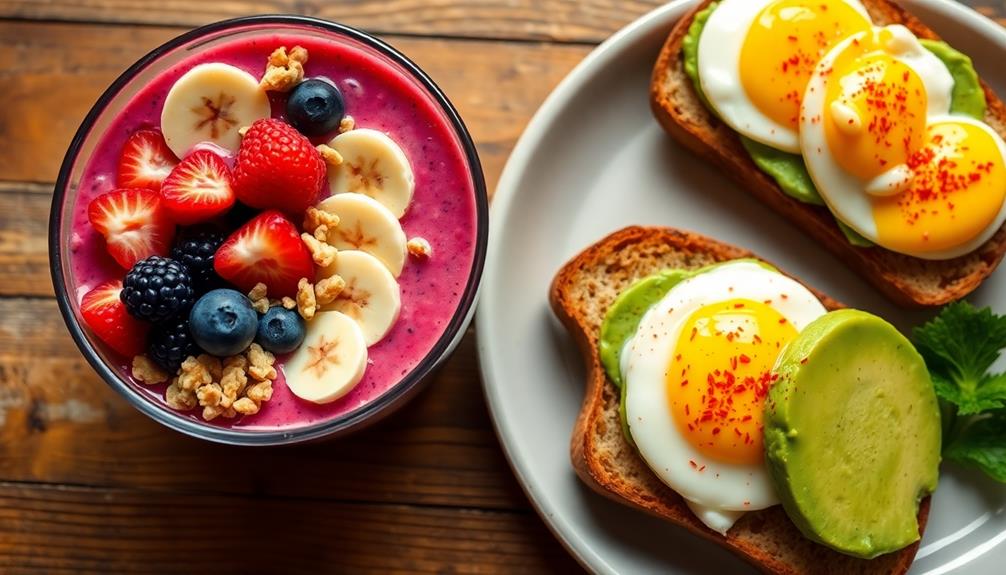
A healthy breakfast can be both delicious and easy to prepare with a few simple recipes. Start your morning with Muffin-Tin Omelets. Customize them with your favorite vegetables and cheeses, and you'll have a protein-rich meal that's ready to eat any day of the week.
You can even make a batch and freeze them for extra convenience.
If you prefer something cool and creamy, try Overnight Oats. They take just minutes to prepare and can be flavored in countless ways, like Cinnamon-Roll or Sriracha, Egg & Avocado.
Top them with fruits and nuts for a nutritious breakfast packed with fiber and antioxidants.
For a hearty option, whip up Breakfast Burritos using plant-based ingredients like tofu. They're not only nutritious but also perfect for on-the-go meals, providing a balanced mix of protein and fiber.
Lastly, don't forget about Breakfast Muffins like Banana Protein Muffins. Made with Greek yogurt, they're moist and portable, making them an ideal baked good.
Prep these in advance, freeze them, and you'll always have a delicious breakfast on hand!
Trusted Nutrition Resources

Finding trusted nutrition resources is vital for making informed dietary choices. You want to verify that your breakfast supports your health goals, and utilizing reliable sources can help you achieve that.
Here are some valuable resources to take into account:
- Harvard School of Public Health: Offers extensive guidelines on balanced meals and whole food choices for peak health.
- NutritionFacts.org: Provides evidence-based information on the health benefits of plant-based diets and how various foods impact chronic disease prevention.
- American Heart Association: Promotes heart-healthy eating patterns, emphasizing the importance of increasing fruits, vegetables, and whole grains while reducing saturated fat and sodium intake.
- USDA's MyPlate: Serves as a practical guide for portion sizes and food groups, encouraging a balanced diet that includes a variety of nutrients.
Consulting these credible sources can keep you informed about nutritional science developments.
If you're unsure about specific dietary needs, think about talking to a registered dietitian. They can provide personalized guidance, helping you make evidence-based choices that enhance your well-being.
Frequently Asked Questions
What Is the Healthiest Breakfast to Start Your Day?
The healthiest breakfast starts with whole grains like oatmeal, adds protein from eggs or Greek yogurt, and incorporates fruits or veggies for vitamins. This combination fuels your day and keeps you satisfied longer.
What Is the Healthiest Thing to Make for Breakfast?
When you're deciding what's healthiest for breakfast, think about Greek yogurt with berries or oatmeal topped with nuts. These options balance protein, fiber, and healthy fats, keeping you satisfied and energized throughout the morning.
What Is a Healthy Breakfast to Kick Start the Day?
You might think a sugary cereal's a great choice, but a healthy breakfast to kickstart your day includes eggs, whole grains, and fruits. These foods'll fuel your energy and keep you feeling satisfied longer.
What Is Healthy to Eat First Thing in the Morning?
To start your morning right, focus on whole grains, fruits, and lean proteins. Oatmeal with berries or Greek yogurt with nuts keeps you full and energized, while avoiding sugary processed foods helps maintain steady energy throughout the day.
Conclusion
Incorporating a healthy breakfast into your routine can feel like a coincidence that transforms your entire day. You might find that, just by choosing nutritious options in the morning, your energy levels soar and your focus sharpens. It's amazing how a simple meal can lead to better choices throughout your day. So, when you sit down for breakfast tomorrow, remember that this small step could set off a chain reaction of positive habits. Embrace the power of a nutritious start!
Recipes and Cooking Tips
What Is the Most Healthy Breakfast You Can Eat? Find Out Now!
Jumpstart your day with the healthiest breakfast options—discover what fuels your morning and keeps you energized all day long!
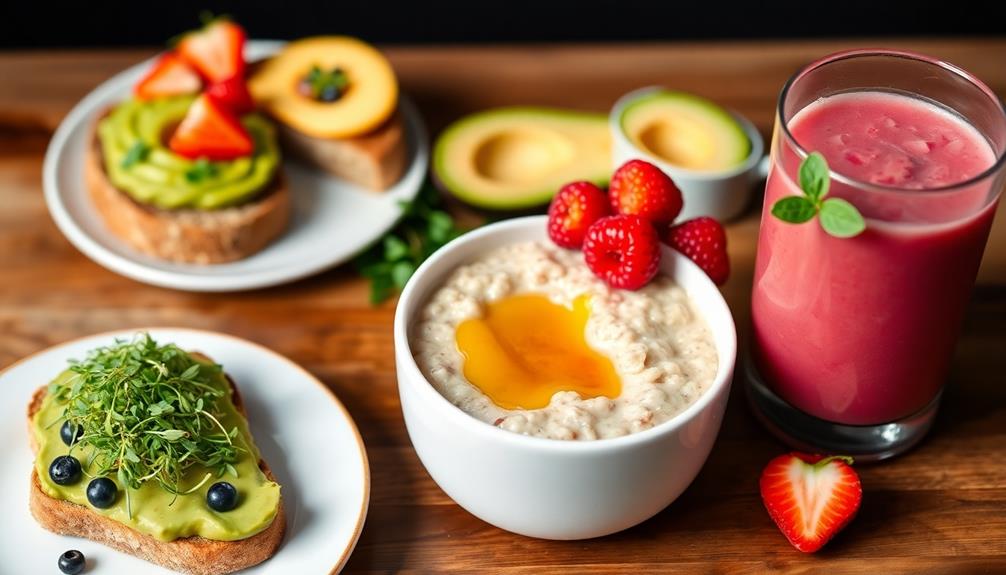
The healthiest breakfast you can eat combines nutrient-dense foods that fuel your morning. Try oatmeal topped with fruits and nuts for fiber and healthy fats. Greek yogurt with berries is another great choice, offering protein and probiotics for gut health. Scrambled eggs packed with choline support brain function, while chia seed pudding promotes fullness with fiber. Avoid sugary cereals and high-calorie pastries, as they spike blood sugar levels. A balanced breakfast will keep you energized and focused throughout the day. Discover more tasty options that fit your lifestyle to enhance your morning routine.
Key Takeaways
- A healthy breakfast includes high-protein foods like Greek yogurt, cottage cheese, or scrambled eggs to promote satiety and support muscle health.
- Oatmeal, especially whole grain or steel-cut, provides fiber and helps regulate cholesterol levels, making it a nutritious breakfast choice.
- Chia seed pudding and overnight oats offer high fiber content and can be prepared in advance for convenience.
- Avoid high-calorie pastries and sugary cereals, as they can lead to blood sugar spikes and lack essential nutrients.
- A balanced breakfast rich in protein, healthy fats, and fiber can enhance energy, focus, and support overall heart health.
Nutritional Benefits of Breakfast Foods
Starting your day with a nutritious breakfast can greatly impact your overall health. Choosing healthy breakfast foods like Greek yogurt and oatmeal can provide you with essential nutrients.
For instance, a 150g serving of Greek yogurt packs about 15 grams of protein, calcium, and probiotics, supporting both muscle health and digestion. If you opt for oatmeal, certified gluten-free options offer about 10 grams of protein and contain soluble fiber, specifically beta-glucan, which helps lower cholesterol levels.
Incorporating cottage cheese into your breakfast can also be a smart move. A cup contains around 24 grams of protein and only 180 calories, making it a satisfying choice.
You might also consider adding chia seeds, which contribute nearly 10 grams of soluble fiber in just one ounce. They help you feel full and support digestion, enhancing your breakfast experience.
Top Healthy Breakfast Options

A nutritious breakfast sets the tone for your day, and there are plenty of healthy options to evaluate. One excellent choice is oatmeal, which, when made with whole grain steel-cut oats, is high in fiber and provides about 10g of protein per cup. It also contains beta-glucan, which can help lower cholesterol and stabilize blood sugar levels.
Another fantastic option is Greek yogurt. A 150g serving packs around 15g of protein and is rich in probiotics, calcium, and vitamin B12, making it ideal for gut health.
For a creative twist, consider chia seed pudding. Just one ounce of chia seeds offers nearly 10g of soluble fiber, promoting fullness and aiding digestion.
If you prefer something savory, a savory oatmeal bowl with vegetables and a poached egg can provide a balanced breakfast, combining fiber, protein, and healthy fats. Two large eggs deliver about 25g of protein and essential nutrients without greatly raising cholesterol levels.
Don't forget to add fruits or vegetables to any of these options for extra vitamins and minerals. With these healthy breakfast choices, you're sure to kickstart your day on the right note!
Protein-Rich Breakfast Ideas

When it comes to fueling your morning, protein-rich breakfast ideas can make all the difference. Including high-protein options not only helps you feel full but also provides essential nutrients to kickstart your day. Here are some tasty ideas:
| Breakfast Option | Protein Content (grams) | Benefits |
|---|---|---|
| Scrambled Eggs | 6 per egg | Rich in choline and lutein |
| Greek Yogurt with Fruit | 15 per 150g serving | Probiotics for gut health |
| Cottage Cheese | 24 per cup | Low in calories, very filling |
| Chia Seed Pudding | 10 per ounce | Aids digestion and promotes fullness |
| High-Protein Smoothie | Varies (depends on mix) | Customizable for your needs |
Incorporating these protein-packed breakfast options into your routine can enhance your healthy eating habits. Consider starting your day with a delightful smoothie or a bowl of Greek yogurt topped with chia seeds. These choices not only boost your protein intake but also keep you energized until lunch, making healthy eating enjoyable and satisfying.
Meal Preparation Tips

When it comes to meal prep for breakfast, batch cooking can be a game changer. You can whip up whole-grain waffles or pancakes in advance, making mornings hassle-free.
Additionally, incorporating nutrient-dense options like celery juice benefits can enhance your morning routine, ensuring you start your day with a nutritious boost.
Plus, overnight oats loaded with chia seeds and fruits can be ready to grab, ensuring you start your day with a nutritious boost.
Batch Cooking Strategies
Batch cooking breakfast items can transform your mornings, giving you healthy options without the stress. By dedicating some time on the weekends to meal prep, you can guarantee nutritious breakfasts are ready to go. Here are some effective batch cooking strategies:
| Breakfast Item | Prep Method | Benefits |
|---|---|---|
| Overnight Oats | Mix oats, milk, and toppings in jars | Grab-and-go, no cooking needed |
| Steel-Cut Oatmeal | Cook a large batch and portion into containers | Hearty and filling throughout the week |
| Freezing Waffles | Cook and freeze whole grain waffles | Quick breakfast, just toast and serve |
| Prepping Breakfast Tacos | Scramble eggs and veggies, store in containers | Protein-rich, easy to heat up |
With these strategies, you can easily create individual portions of smoothies by pre-portioning fruits and protein powder in freezer bags, making blending a breeze. Freezing waffles offers a quick breakfast option that's still healthy. By prepping breakfast tacos in advance, you'll enjoy a satisfying start to your day. Embrace batch cooking and enjoy stress-free, delicious mornings!
Overnight Preparation Ideas
Getting a head start on your morning routine can make all the difference, and overnight preparation ideas are a game changer for busy schedules. One simple option is to prepare overnight oats with chia seeds and berries. This nutrient-dense meal isn't only high-fiber but also loaded with vitamins and antioxidants to kickstart your day.
You can also whip up chia seed pudding by mixing chia seeds with your choice of milk or Greek yogurt the night before. This results in a low-sugar, high-fiber breakfast that supports digestion and keeps you full.
If you're a fan of smoothies, prep your smoothie ingredients in advance and freeze them. This way, you can blend a nutritious mix of fruits, vegetables, and protein in just minutes.
Lastly, portion out Greek yogurt in jars and top it with granola and nuts. This offers a convenient, protein-packed breakfast rich in healthy fats, ready to grab and go.
Foods to Avoid for Breakfast

When you're planning breakfast, it's essential to steer clear of high-calorie pastries and sugary cereals.
These options can spike your blood sugar and leave you feeling hungry soon after.
Processed meats also don't make the cut, as they can pack unhealthy fats and sodium that aren't good for your health.
High-Calorie Pastries
Many people enjoy indulging in high-calorie pastries like croissants and danishes for breakfast, but these choices can be detrimental to your health. These pastries often contain unhealthy fats and added sugars, leading to rapid spikes in blood sugar levels. With a typical serving exceeding 300 calories and minimal nutritional value, they're a poor choice for a balanced breakfast.
Most high-calorie pastries are made with refined flour, which lacks essential nutrients and fiber. This contributes to feelings of hunger shortly after consumption, making you reach for more food sooner. Frequent consumption of these processed foods can heighten your risk of obesity and related health issues, given their low satiety and high caloric density.
Additionally, many pastries contain trans fats, which can elevate bad cholesterol levels and increase the risk of heart disease.
To promote better health, it's wise to steer clear of high-calorie pastries in favor of options that provide more nutrients and sustain your energy levels throughout the morning. By choosing healthier alternatives, you can set the stage for a more fulfilling and nutritious day.
Sugary Cereals
Sugary cereals frequently lure you in with their colorful packaging and enticing flavors, but they can be a deceptive choice for breakfast. While they might seem convenient, these cereals are often loaded with added sugars, sometimes containing 10-30 grams per serving. This high sugar content can lead to excessive calorie intake and potential weight gain.
Furthermore, sugary cereals typically lack essential nutrients like fiber and protein, which are vital for keeping you full and energized throughout the morning. When you eat these processed cereals, you may experience spikes in blood sugar, followed by crashes that trigger increased hunger and cravings for unhealthy snacks later.
Regularly consuming sugary cereals has been linked to chronic health issues, including obesity, type 2 diabetes, and heart disease. This highlights the importance of choosing healthier breakfast options.
Instead of sugary cereals, consider whole grain alternatives that provide essential nutrients and sustained energy. These options help you maintain a nutritionally balanced diet and can support your overall health.
Processed Meats
Processed meats, like bacon and sausage, might seem like a tempting way to kick off your day, but they come with significant health risks. These foods are often high in saturated fats and sodium, which can contribute to increased blood pressure and raise your risk of cardiovascular disease.
Health experts warn that consuming processed meats for breakfast is linked to a higher risk of developing chronic diseases, including certain cancers.
Moreover, many processed meats contain preservatives like nitrates and nitrites, which are associated with negative health effects. Eating these meats can also lead to spikes in insulin and blood sugar levels, affecting your energy stability throughout the day.
Instead of reaching for that greasy breakfast, consider opting for healthier options.
A nutritious breakfast filled with whole foods—like fruits, vegetables, and lean proteins—can set a positive tone for your day. By avoiding processed meats, you'll be making a smart move towards a healthier lifestyle.
Embrace choices that fuel your body and support long-term health, steering clear of those tempting, yet harmful, processed meats.
Importance of a Balanced Breakfast
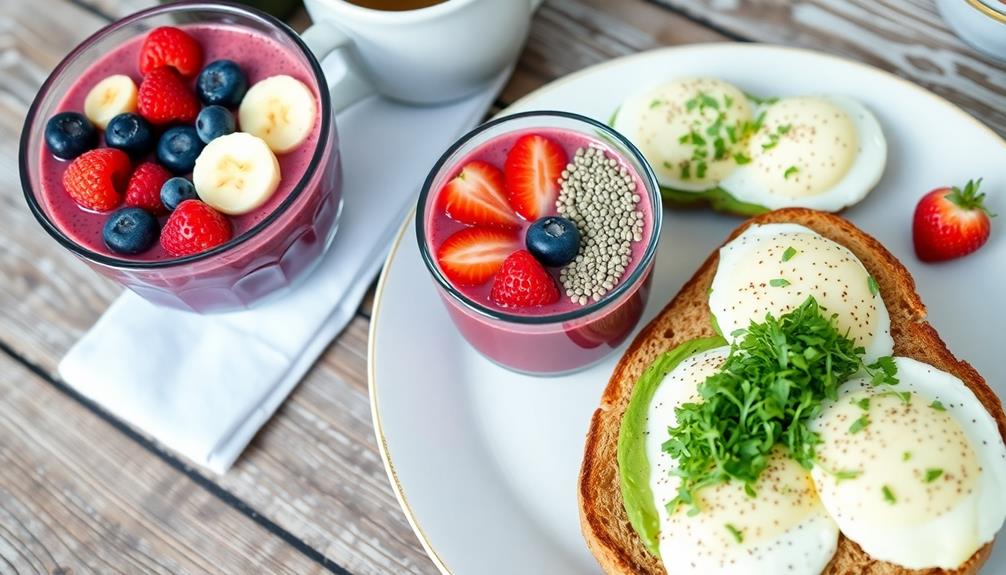
Starting your day with a balanced breakfast is essential for maintaining energy and focus throughout the morning. A meal rich in protein and healthy fats, along with fiber, helps sustain your energy levels and prevents those pesky mid-morning cravings, contributing to overall weight management.
When you choose nutrient-dense healthy foods, you not only keep your hunger at bay but also boost your cognitive function. Studies show that individuals who eat a balanced breakfast experience improved concentration and memory.
Opting for quality choices like whole grains and fruits is also linked to better heart health, as whole grains can lower the risk of heart disease.
Regularly eating breakfast helps you meet daily nutritional recommendations, ensuring you get essential nutrients like fiber, calcium, and vitamins. Conversely, skipping breakfast can lead to an increased risk of obesity and metabolic disorders, underlining the importance of starting your day with a balanced meal.
Prioritizing a nutritious breakfast not only supports your metabolic health but also sets a positive tone for your overall diet throughout the day. So, make that healthy breakfast a daily habit!
Frequently Asked Questions
What Is the Number One Healthiest Breakfast?
When considering the number one healthiest breakfast, focus on options rich in protein, fiber, and healthy fats. Think oatmeal with fruits, Greek yogurt parfaits, or eggs with avocado to fuel your morning effectively.
What Is the First Thing You Should Eat in the Morning?
When you wake up, prioritize a protein-packed breakfast like eggs or Greek yogurt. These options boost satiety and stabilize your blood sugar, helping you feel fuller and more energized throughout the day.
What Is the First Thing You Should Eat in the Morning for Gut Health?
To promote gut health, start your morning with Greek yogurt, chia seeds, or overnight oats. Incorporating fermented foods and berries enhances digestion and provides essential nutrients, setting a healthy tone for your day.
What Do Cardiologists Eat for Breakfast?
Imagine a sunrise bursting with color; that's how cardiologists view breakfast. They savor oatmeal with berries, Greek yogurt with fruit, or avocado toast, fueling their day with heart-healthy choices that nourish both body and soul.
Conclusion
In the grand symphony of your day, breakfast is the opening note that sets the tone. By choosing nutritious options like whole grains, fruits, and lean proteins, you'll fuel your body and mind for success. Remember, it's not just about filling your stomach; it's about nourishing your well-being. So, craft your morning meal with care, and watch how it transforms your energy and focus throughout the day. Start strong, and let the harmony begin!
Recipes and Cooking Tips
What Is a Healthy Breakfast With No Carbs? Try These Low-Carb Options!
A healthy breakfast without carbs can energize your day; explore these delicious low-carb options that will keep you satisfied and craving more!

A healthy breakfast with no carbs can set a great tone for your day. Start with scrambled eggs, which are packed with protein and virtually carb-free. Pair them with spinach and feta for added flavor. You could also try an avocado smoothie, blending avocado with spinach for a creamy, nutritious drink. Greek yogurt, when unsweetened, offers protein with minimal carbs, especially when topped with nuts. For something different, make chia seed pudding overnight. Each of these options supports energy levels and reduces cravings, keeping you satisfied longer. Discover even more delicious ideas ahead!
Key Takeaways
- Scrambled eggs with spinach and feta provide a high-protein, low-carb breakfast option that's quick to prepare.
- Greek yogurt (unsweetened) offers a creamy, low-carb alternative packed with protein and probiotics.
- Avocado is a nutritious choice, rich in healthy fats with only 2 grams of net carbs per 100 grams.
- Chia seed pudding made with unsweetened almond milk is fiber-rich and low in carbs, ideal for overnight prep.
- Omelets filled with low-carb vegetables like bell peppers and cheese make for a satisfying, nutritious breakfast.
Benefits of Low-Carb Breakfasts
When you choose a low-carb breakfast, you're not just making a meal choice; you're setting the tone for your day. Opting for low-carb breakfasts supports weight loss by reducing insulin levels, which allows your body to utilize stored fat as energy instead of relying on carbohydrates.
This shift can lead to increased satiety, meaning you'll have fewer cravings throughout the day and better portion control. Incorporating healthy fats into your breakfast, like those found in coconut oil as a beneficial fat source, can further enhance your energy levels and promote ketosis.
Additionally, a low-carb breakfast can enhance your mental clarity and focus. With more stable blood sugar levels, you're less likely to experience those frustrating energy dips linked to high-carb meals.
This stability is key to maintaining consistent energy levels throughout your day.
Popular Low-Carb Ingredients

Choosing the right ingredients can greatly enhance your low-carb breakfast experience. By incorporating nutrient-dense foods, you'll not only keep your carb intake low but also boost your protein and healthy fats. Here are some popular low-carb ingredients to contemplate:
Additionally, focusing on whole foods is essential for maintaining a healthy keto diet, as it guarantees you get the necessary nutrients while keeping carbs to a minimum. Think about exploring meal prep strategies to make your breakfast routine easier and more enjoyable.
- Eggs: A breakfast staple, eggs provide around 6 grams of protein each, along with essential nutrients like vitamin B12 and choline, while containing virtually no carbs.
- Avocado: Packed with healthy monounsaturated fats and fiber, avocado has just 2 grams of net carbs per 100 grams, making it perfect for low-carb breakfast recipes.
- Greek Yogurt: Unsweetened Greek yogurt is low in carbs, boasting around 4 grams per 100 grams. It's high in protein and probiotics, promoting gut health for a healthy breakfast.
- Nuts and Seeds: Almonds and chia seeds are rich in healthy fats and protein. Almonds contain about 2.9 grams of net carbs per ounce, making them excellent for topping or snacking on.
Incorporate these ingredients into your ketogenic diet for a satisfying and nutritious breakfast!
Quick Low-Carb Breakfast Ideas

When you're short on time, quick low-carb breakfasts can save the day.
You can whip up easy recipes like scrambled eggs with spinach or prepare meals in advance, like egg muffins or chia seed pudding, for those busy mornings.
Let's explore some delicious options and meal prep tips to keep your mornings hassle-free and nutritious.
Easy Recipes to Try
Looking for quick and easy low-carb breakfast ideas? Here are four delicious recipes you can whip up in no time, each packed with nutrients and designed to keep your carb intake low.
For more inspiration, check out easy keto breakfast ideas to fuel your mornings.
- Scrambled Eggs with Spinach and Feta: In under 10 minutes, you can enjoy fluffy scrambled eggs mixed with fresh spinach and crumbled feta cheese. This dish is packed with protein and low in carbs.
- Chia Seed Pudding: Combine chia seeds with unsweetened almond milk and let it sit overnight. In the morning, you'll have a fiber-rich pudding that's perfect for a grab-and-go breakfast.
- Avocado Smoothie: Blend half an avocado with spinach and your favorite protein powder for a creamy, nutrient-rich smoothie that keeps your carbs in check.
- Omelet with Bell Peppers and Cheese: Whip up an omelet filled with colorful bell peppers and your choice of cheese. It's easy to make and delivers a hearty dose of protein and healthy fats.
Each of these recipes isn't only low carb but also quick to prepare, making them ideal for busy mornings.
Enjoy a nutritious start to your day without the extra carbs!
Meal Prep Tips
For busy mornings, meal prepping can be a game changer, especially when it comes to low-carb breakfasts. Start by making egg muffins loaded with various vegetables and meats. These nutritious bites can be stored in the fridge and reheated quickly.
If you love pancakes, consider batch-cooking low-carb pancakes using almond flour. They're delicious and easy to warm up throughout the week.
Another great option is overnight chia seed pudding. Combine chia seeds with unsweetened almond milk and let it sit overnight for a fiber-rich breakfast that's ready to go when you wake up.
For something quick, prepare Greek yogurt cups with low-carb fruits and nuts as toppings. These make for grab-and-go options that taste amazing.
Lastly, don't forget about smoothie packs! Pre-measure low-carb ingredients like spinach, avocado, and protein powder, then freeze them. In the morning, just blend your smoothie pack with water or almond milk for an instant breakfast.
With these meal prep tips, you'll have a variety of low-carb breakfasts ready to fuel your day!
Meal Prep for Low-Carb Options

Meal prepping low-carb breakfasts can really streamline your mornings, letting you grab nutritious options without the fuss.
You can batch cook items like egg muffins or chia pudding, making it easy to store and reheat throughout the week.
Plus, with a few freezing tips, you'll always have quick, delicious meals on hand.
Quick Breakfast Ideas
A collection of quick breakfast ideas can simplify your mornings while keeping your carb intake low. Meal prepping is your best friend when it comes to guaranteeing you have nutritious, easy breakfast options ready to go.
Here are four simple choices:
- Egg Muffins: Whip up a batch of egg muffins filled with vegetables and cheese. They're easy to make and can be reheated in minutes.
- Chia Seed Pudding: Prepare overnight chia seed pudding with almond milk and a sweetener of your choice. It's a high-fiber breakfast that's ready when you wake up.
- Cauliflower Hash Browns: Batch cook cauliflower hash browns or zucchini fritters for a savory breakfast option. Just reheat them in the morning and enjoy!
- Smoothie Packs: Create smoothie packs by portioning out low-carb fruits and greens. In the morning, just blend and go!
These quick breakfast ideas not only save you time but also guarantee you get enough protein at breakfast while staying low in carbs. Enjoy a nutritious start to your day without the fuss!
Batch Cooking Strategies
Batch cooking is a game-changer for anyone looking to simplify their low-carb breakfast routine. By preparing meals in advance, you can save time and always have nutritious options on hand. Consider making egg muffins or frittatas, which can last up to a week in the fridge. You can also streamline your mornings by chopping vegetables and pre-cooking meats ahead of time.
Here's a quick guide to help you with your low-carb meal prep:
| Meal Type | Recipe Idea | Storage Tip |
|---|---|---|
| Egg Muffins | Spinach & Cheese | Store in fridge |
| Frittatas | Veggie & Sausage | Cut into slices |
| Freezer-Friendly | Baked Avocado Eggs | Freeze in portions |
Portioning meals into individual containers makes it easy to choose your breakfast and keeps your portions in check. Plus, incorporating a variety of flavors and ingredients during meal prep prevents monotony, making it easier to stick to your low-carb lifestyle. Embrace batch cooking, and you'll never face a hectic morning without a healthy breakfast again!
Freezing and Reheating Tips
After you've prepared your low-carb breakfast options, knowing how to freeze and reheat them properly can make all the difference in maintaining their quality and flavor.
Here are some essential tips to guarantee your frozen low-carb meals stay delicious:
- Use Airtight Containers or Freezer Bags: Store your meals in airtight containers or freezer bags, removing as much air as possible to prevent freezer burn.
- Portioning Out Meals: Before freezing, portion out meals into individual servings. This way, you can conveniently access pre-prepared breakfasts without thawing large quantities.
- Label Frozen Meals: Always label frozen meals with the date and contents. This helps you keep track of what you have stored and guarantees you consume frozen meals before they go bad.
- Reheating Frozen Meals: When it's time to eat, use a microwave or oven for reheating frozen meals. For best flavor and texture, heat at a lower power setting or cover the dish to retain moisture.
Tips for a Low-Carb Routine

Establishing a low-carb routine can be simple and rewarding with the right strategies in place. Start by planning your weekly menus focused on low-carb ingredients. This approach helps you avoid high-carb temptations and guarantees you maintain a balanced diet. Incorporate high-protein foods like eggs, Greek yogurt, and nuts to enhance satiety and reduce cravings.
Meal prepping is another great tactic. Consider preparing egg muffins or low-carb pancakes for quick breakfasts during busy mornings. Here's a quick overview of some effective tips:
| Tip | Description |
|---|---|
| Meal Prepping | Prepare low-carb meals in advance for convenience. |
| Keep Low-Carb Snacks Handy | Stock up on cheese, nuts, and other low-carb options. |
| Track Carbohydrate Intake | Monitor hidden carbs in foods to stay on track. |
High-Protein, Low-Carb Recipes

A delicious way to kickstart your day is with high-protein, low-carb recipes that keep you energized and satisfied.
These options not only fill you up but also help maintain your energy levels throughout the morning. Here are some tasty ideas to contemplate:
- Scrambled Eggs with Spinach and Feta: Whip up some scrambled eggs, adding fresh spinach and feta cheese for a protein-packed meal with minimal carbs.
- Cottage Cheese Bowl: Enjoy a bowl of cottage cheese topped with your favorite seeds or nuts for an easy, high-protein breakfast.
- Keto Egg Cups: Customize these by mixing eggs with vegetables and cheese, bake them in muffin tins, and you'll have a grab-and-go breakfast option that's delicious and nutritious.
- Almond Flour Pancakes: Prepare low-carb pancakes using almond flour or cream cheese, serving them with a side of crispy bacon or breakfast sausage for that extra protein boost.
Delicious Low-Carb Breakfast Options

Starting your day with a low-carb breakfast can be both satisfying and delicious, keeping your energy levels up and cravings at bay. One great option is scrambled eggs loaded with low-carb vegetables like spinach and bell peppers. You can also try baked avocado eggs: just halve an avocado, scoop out some flesh, crack an egg into each half, and bake until creamy.
For something a bit different, whip up some crispy cauliflower hash browns. They make a fantastic side or can stand alone.
If you prefer a lighter option, consider a Greek yogurt parfait. Use full-fat Greek yogurt topped with nuts and chia seeds for added crunch and nutrition. This combination offers probiotics and healthy fats without the sugar overload.
Don't forget about chia seed pudding! Mix chia seeds with unsweetened almond milk and let it sit overnight for a fiber-rich breakfast that keeps you full.
Frequently Asked Questions
What's a Good Breakfast With No Carbs?
For a good breakfast with no carbs, try scrambled eggs with avocado, Greek yogurt with nuts, or bacon and eggs. These options provide protein and healthy fats, keeping you full and energized throughout the morning.
What Is the Best Breakfast for Weight Loss?
Think of breakfast as your launchpad for the day. To lose weight, fuel yourself with high-protein options like eggs, add healthy fats like avocado, and include fiber-rich foods for lasting energy and satisfaction.
What Is Healthy to Eat With No Carbs?
If you're looking for healthy no-carb options, focus on protein-rich foods like eggs and Greek yogurt. Incorporate healthy fats such as avocado, plus non-starchy veggies for added nutrients and flavors without the carbs.
What Is the Most Successful Low Carb Diet?
The most successful low-carb diet focuses on whole, unprocessed foods, emphasizing lean proteins, healthy fats, and non-starchy vegetables. It encourages your body to burn fat for energy, promoting weight loss and improved metabolic health.
Conclusion
Incorporating low-carb breakfasts into your routine can be a game changer for your health. With a variety of delicious options at your fingertips, you can kickstart your day without the carb crash. Remember, it's not just about cutting carbs; it's about fueling your body right. So, why not take the plunge and give these tasty meals a try? You'll not only feel great but might just discover a new favorite breakfast that keeps you energized all morning long!
-

 Cultural and Regional Breakfasts4 months ago
Cultural and Regional Breakfasts4 months agoBest Breakfast in Wisconsin Dells You Have to Try!
-

 Cultural and Regional Breakfasts5 months ago
Cultural and Regional Breakfasts5 months agoTaiwanese Breakfast Dishes You Have to Try!
-

 Cultural and Regional Breakfasts4 months ago
Cultural and Regional Breakfasts4 months agoHardee’s Breakfast Time – Start Your Day Off Right!
-

 Cultural and Regional Breakfasts4 months ago
Cultural and Regional Breakfasts4 months agoBest Breakfast Spots in Omaha You Can’t Miss!
-

 Cultural and Regional Breakfasts5 months ago
Cultural and Regional Breakfasts5 months agoCape May Bed and Breakfast – A Coastal Retreat Awaits!
-

 Cultural and Regional Breakfasts6 months ago
Cultural and Regional Breakfasts6 months agoClassic American Breakfasts That Will Make Your Morning!
-

 Catering and Delivery6 months ago
Catering and Delivery6 months agoBreakfast Delivery Options That Will Blow Your Mind!
-

 Restaurant and Fast Food Breakfast6 months ago
Restaurant and Fast Food Breakfast6 months agoHardee's Breakfast Hours Revealed – Don’t Miss Out!







